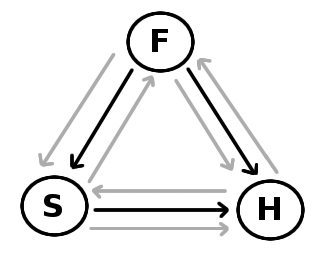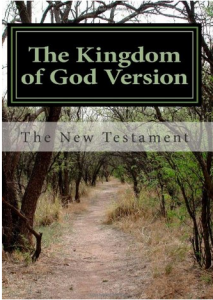Dialogue with John on Thinking about the Trinity
At his blog Faith & Scripture, my friend John interacts with the questions for the reader in chapter 10.
At his blog Faith & Scripture, my friend John interacts with the questions for the reader in chapter 10.
We’ve covered this before. Craig slurs the argument, making the conclusion a bit unclear. The point is not really that a three-self trinitarian theology is just somehow superior to a unitarian theology. Rather, the point is supposed to be that the concept of a perfect being who is a self collapses into incoherence; it is perfect, yet (the idea is) lacks a feature any perfect… Read More »Craig’s a priori argument for a three-self Trinity
Arguing about what is essential to a trinitarian theology, and about a seemingly incoherent Trinity theory.

How the three are tightly functionally unified, in Swinburne’s view.
(See below for the interpretation.)
Last time we looked at Swinbure’s suggested reading of the creeds. They can’t he says, be charitably read as holding that in the same sense there’s only one divinity, and that there’s three. Swinburne comes down on the side of three. Like all social trinitarians, he’s attracted to a vision of the Trinity as being a loving community, three eternal and perfect, spirits, three selves, enjoying one another’s company, living in communion with one another, and working together in all they do. In short, he wants to say there are personal relationships internal to God – and this implies that there are persons – subjects of experience, thought, and action – in God.Read More »Swinburne’s Social Trinitarian Theory, Part 3 – functional monotheism
![]()
Swinburne isn’t what you’d call a theological liberal. He’s not a conservative evangelical either, given his rejection of things like biblical inerrancy. He was, I believe, a life-long Anglican, until 1996 when he converted to Eastern Orthodoxy. As I understand it, at least part of his motivation was his exasperation with anything-goes style Anglicanism (e.g. priests who are not theists). But my point is that he aims to be a “Catholic” Christian, in the sense of one who holds to mainstream orthodoxy – roughly, that core of doctrines held in common by Catholicism, Eastern Orthodoxy, and (at least in theory) most Protestants. (Actually, he’s probably a good bit more “Catholic” than that – in that he believes in apostolic succession, and in the authority of The Church to decree the meaning of scriptural texts – see his book Revelation.) This requires some dexterity on his part, and creates the burden of crafting a theory that one can claim fits with the “Athanasian” and Constantinopolitan Creeds.
Swinburne argues that it is uncharitable to read the ecumenical councils’ claim that “there is only one god” as asserting that there’s only one divine individual, as that would contradict their committment to there being three divine individuals.Read More »Swinburne’s Social Trinitarian Theory, Part 2 – a key move
An interesting and much more recent statement from John Hick, along the lines of my last post. …Since then [around 1993] the focus of much theological discussion has moved from christology to the doctrine of the Trinity. This is partly because theology always does go the rounds of the traditional topics – creation, sin, incarnation, atonement, Trinity, church, heaven and hell – and after a… Read More »Is the doctrine of the Incarnation prior to & the source of trinitarian doctrine? – Part 2
I was reading famous philosopher of religion John Hick‘s contribution to the 1982 book The Concept of Monotheism in Islam & Christianity, and ran across an interesting idea. Let me put it in context. If you know anything about Hick, you can guess that in his chapter he’s is ultimately trying to promote his unique theory of religious pluralism. Here’s the connection he sees between… Read More »Is the doctrine of the Incarnation prior to & the source of Trinitarian doctrine? – Part 1
Continuing from last time, on the multiplicity of interpretations of the old catholic formulas – quoting David Waltz, our friend Annoyed Pinoy comments on the diversity of Trinity theories: [Waltz:] Now, when we look at “the” Evangelical doctrine of the Trinty, one is forced to conclude that it is “doctrines”, not “the doctrine”, for the following are but a few examples of the different forms… Read More »On a Rebuttal to my “How Trinity theories conflict with the New Testament” – Part 2
A new paper on when and how the biggest change in the history of mainstream Christian theology occurred.
…let me comment on your later post where you explained, on a biblical level, what pointed you to converting to Orthodoxy…
The rebuttal is to this blog post of mine, and it is by a Blogger user named “Annoyed Pinoy,” with whom I briefly discussed these things in the comments here. I take it that he is an evangelical Christian who is interested in theology – that’s all I know about him, other than that he is a Filipino in Illinois who is smart, curious, and… Read More »On a Rebuttal to my “How Trinity theories conflict with the New Testament” – Part 1
Understanding “the plural of majesty” in the Hebrew Bible.

Richard of St. Victor is well known for talking about love, and how awesome it is. It might surprise a few people who have only read the popular English translation of Book 3 (the love/ethics? book) that On the Trinity contains six books. The English translation has brought attention to what some contemporary (continental-esque) philosophers would call Richard’s ‘erotics’. What remains to be seen is whatever he says in Books 1, 2, 4, 5, and 6. In this post I’d like to focus on one theme in these other books, which I’ll call Richard’s Constitutional Latin Trinitarianism (= CLT). At the start I must say that I am claiming that Richard suggests a constitutional model of the Trinity and not that he straightforwardly proposes one. At least, Richard can be read to propose such a model–after all, certain later scholastics like Henry of Ghent seem to have read Richard in that way.
Read More »Richard of St. Victor 8 – A Proposed Constitutional Trinitarian Taxonomy (Scott)
This time, some questions that may occur to you about Clarke’s views on the Trinity.
 As pretty well summarized here by unitarian Theophilus Lindsey.
As pretty well summarized here by unitarian Theophilus Lindsey.
In the year 1694 began the great contest concerning the Trinity, betwixt two celebrated doctors of the church, Sherlock and South; each of them reputed and reputing himself orthodox, and each of them espoused by learned and powerful partisans.
Dr. Sherlock expressly asserted, that the three persons in the Trinity are three distinct, infinite Minds or Spirits, and three individual Substances. Dr. South held only one infinite eternal Mind or Spirit, with three Somethings that were not three distinct Minds of Substances, but three modes, faculties, attributes, relations, relative properties, subsistances, as there were variously denominated. Dr. Sherlock was accused, and with great justice, if words have any meaning, of polytheism, or holding three Gods. Dr. South, on the other hand, came under the imputation of explaining away the Trinity, and falling into the Sabellian or Unitarian system: and accordingly some of the Socinians took advantage of the Doctor’s explication of the doctrine of the church, and declared in their writings, that the should not be backward to give their approbation to the Liturgy and the Articles, if that was the kind of Trinity which the language therein used was intended to inculcated.
The university of Oxford, to whom Sherlock was obnoxious on account of his political principles, declared forRead More »the fate of “social” trinitarianism in late 17th c. England (Dale)
 I think I’ve met only two people who have translated the whole New Testament from the original Koine Greek to some modern language. One was an American evangelical missionary, who’d translated the New Testament into some obscure tribal language from South America. The other was the Englishman Ray Faircloth, who runs the biblicaltruthseekers website. (Some of his materials are also available here.)
I think I’ve met only two people who have translated the whole New Testament from the original Koine Greek to some modern language. One was an American evangelical missionary, who’d translated the New Testament into some obscure tribal language from South America. The other was the Englishman Ray Faircloth, who runs the biblicaltruthseekers website. (Some of his materials are also available here.)
In both cases, I was impressed. What an acheivement, and what a weight it must be, to try to effectively and accurately render what one regards as the most important texts in human history, the communications of God to humankind.
I was privileged to be able to interview Ray Faircloth a few days ago near Atlanta, Georgia, where we were both in town for a conference. Maybe at a later date I’ll post a few representative passages from his translation.
Congratulations on the publication of your translation of the New Testament, The Kingdom of God Version. How long did this take you?
This took three and half years.
Was that full time?
No, it was in blocks of time, so that you’d get so far, and you’d need to move on to another subject, and come back to it at a later time.
What, in your view, is most distinctive about your Kingdom of God Version?
It’s hard to say one thing, but much of it was attempt to get rid
Read More »Interview with Ray Faircloth, translator of the Kingdom of God Version of the New Testament
Still waiting for substantial replies to my Challenge to evangelical “Jesus is God” apologists. Some have worried that the meaning of “God” is somehow problematic here. There is an ambiguity here, but it is deliberate, and is a virtue of the argument. You can take “God” here to be either the Father (as in the NT) or the Trinity (as in trinitarian traditions) – either… Read More »“God” in the Challenge argument
What, according to Dr. Sanders, is the crisis in contemporary trinitarian systematic theology, when it comes to the Bible?
“The dissolution of a mythology is no less natural a process than its growth, and is indeed secured the moment we have discovered how it has grown…”